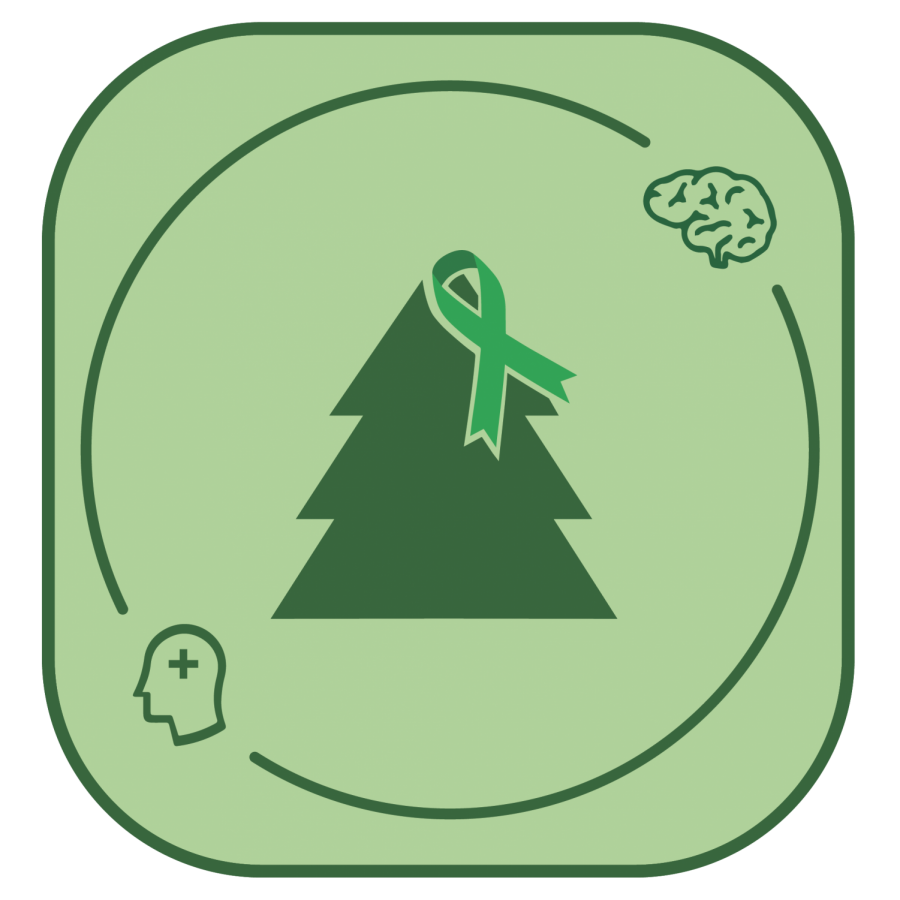‘Bearing witness to other people’s suffering can take its toll’
Law enforcement officers, health care worker reflect on their experiences with mental health crises; coping with job-related trauma is essential to a prolonged career
“We’re all susceptible to struggling,” Cunningham Chilton said. “This isn’t something that should have stigma attached to it.”
February 25, 2021
Editor’s Note: This story is part of the news section’s Mental Health Series and contains themes of suicide and other mental health issues. If you need help, please contact the National Suicide Prevention Lifeline at 800-273-8255. If you would like to share a story idea for the Mental Health Series or would like to share your mental health experience, please email news@dailyevergreen.com.
Failure to notice the belt hanging out of a pocket could have led to the loss of a life.
Heidi Lambley, Pullman Police Department senior patrol officer, remembers this incident. The event happened years ago, but the impact of that memory still resonates with her.
She said she searched for the individual for hours. The person’s family received news the individual planned to hang himself. When Lambley found him, he was adamant he was fine and denied his plans to attempt suicide.
“Had I not noticed that little piece of his belt hanging out, he would have never said anything,” Lambley said.
Frontline of mental health crises
Memories like this sometimes haunt officers. The emotional impact of those events dwell with officers, especially when affected families contact them after the loss of a loved one.
During Mother’s Day, Lambley received a call from a mother whose child died by suicide. Lambley said it was the mother’s first Mother’s Day without her child.
“It was a difficult call because what do you tell somebody whose kid has died?” she said. “Finding the words is really difficult.”
Pullman PD Cmdr. Jake Opgenorth said he was surprised by how many thank you cards he received from victim’s families. He has saved those cards over the years.
“When the family feels the need to send you thank you cards and communicate with you down the road,” he said, “you become somebody that’s important to them.”
Despite all the emotions an officer can go through during these moments, law enforcement is on the frontline of mental health crises. Opgenorth said officers must respond in a timely manner.
The first priority is to make sure no one is in danger, Opgenorth said. The department has to make sure the scene and everyone present is safe. Once everyone is safe, officers will determine what the best response would be for the incident.
Officers allow individuals to open up and let the person know they are loved. Opgenorth wants the community to know the department is there to help the person. A person will not be arrested for being suicidal or attempting suicide. The goal is to preserve life, he said.
Conversations with someone who is attempting suicide can be intimidating for all parties. The officers do not know whether the individual is about to attempt suicide or turn on first responders in a moment of panic, Opgenorth said.
“Be human and talk to them,” he said. “Let them know that we care, and hope they open up.”
In the event of a completed suicide, Pullman PD is unable to clean the scene due to a lack of proper resources. Opgenorth said this is the worst part of the job. Officers have to leave the aftermath of a suicide almost as it was when they arrived.
Pullman PD will offer the victim’s family contacts for companies who can effectively take care of the scene, he said.
Conversations with victims’ families
Officers often feel like they know the victim after hearing stories from families, Opgenorth said. Loved ones tell all the amazing things about the victim and how loved the individual was.
After conversing with the victim’s family, officers must face the scene of the death. It feels like losing a friend, Opgenorth said.
“The family oftentimes turn to you as somebody that they need support from,” he said. “Sometimes you’re the one that kind of needs support, too.”
When a suicide occurs, families will sometimes come up with any theory as to how the death could be ruled as something other than a suicide, no matter how strong the evidence. It is extremely difficult to process the death of a loved one, he said.
There are answers Pullman PD is unable to provide the family, and that can make the grieving process challenging for them, Opgenorth said.
Everyone involved finds themself asking: what if the officers had not responded? What if a friend reached out to the individual on that day? What if the family had made more of an effort to get the person help?
Whether the death is completed or not, officers, health care professionals, family and friends are all affected by suicide. Questions regarding the “what ifs” stay with these people for a long time, Opgenorth said.
Treatment and care
When a suicide attempt has been made, transportation to Pullman Regional Hospital is usually involuntary. Opgenorth said officers cannot give someone the opportunity to deny treatment and reattempt suicide once first responders leave the scene.
“We don’t have a lot of options,” he said. “Really our only options are whether we take someone voluntarily or involuntarily to the hospital.”
The person is then in the hands of the mental health professionals, he said.
Sometimes individuals will voluntarily be transported to PRH if they recognize they are in crisis and want help. Interactions with suicidal individuals can be unpredictable though.
Once the patient arrives at the hospital, Palouse River Counseling evaluates their mental health, said Jeana Boyd, PRH clinical social worker. PRH staff also monitor the patient during their stay in the hospital.
Hospital staff removes any personal belongings and objects that could potentially be used for self harm, she said.
Palouse River Counseling staff determines the level of care patients need and provide a treatment plan for PRH staff to follow, Boyd said.
Mike Berney, executive director for Palouse River Counseling, said staff conduct counseling virtually because of the pandemic.
“[Remote counseling] drains the counselor in a different way,” Berney said.
Officers, counselors coping with mental health crises
It is difficult for counselors to not have the resources needed to meet the needs of the community. Counselors are human beings first, Berney said, so they are impacted significantly by their patients’ sufferings.
Counselors have their own counselors as well, he said. Counseling is not only a place to vent but a place to learn how to approach negative situations.
“If you’re a professional in a particular area, sometimes you feel like, well, I should have all the answers,” Berney said. “Well, nobody has all the answers.”
To cope with her frequent exposure to people’s trauma and suffering, Boyd said she practices self-care like exercising and reading to maintain her “emotional gas tank.” She also only sees six patients per day to ensure she does not experience emotional burnout.
“Your ability to be present with people in their suffering is based on the amount of emotional energy you have to give,” she said.
Despite the challenges within her profession, Boyd said she is also fortunate enough to witness people’s resiliency and hear their stories of overcoming obstacles in life. There is a worldview shift that occurs when being exposed to people’s myriad life experiences.
Officers receive regular training throughout the year to help them respond to mental health crises. De-escalation training has become a standard among many other practices for police around the nation, Opgenorth said.
In one recent incident, a person hung up on a call with a 911 dispatcher, he said. Upon calling the individual back, the person said everything was fine.
Pullman PD responded to the residence anyway and began asking family members about what was going on at the time, Opgenorth said.
The family told Pullman PD one of the members was missing. Officers then found the individual in the backyard with a shotgun to his head. Opgenorth said the person had every intention of shooting himself.
In this situation, a wrong move could mean this person ending their life, he said.
“When we show up,” Opgenorth said, “we’re strangers to them.”
Officers talked with the individual for an extended period of time, attempting to de-escalate the scenario. Eventually, the person threw the shotgun to the ground and was voluntarily transported to the hospital, he said.
Later on, that same individual thanked the department for their support in that moment. If officers had not responded to the 911 dispatch, the person likely would have completed the suicide.
Moments like these stay with officers for the duration of their life. These events are traumatic for anyone. Police officers are humans, too. In that moment, an officer will get a rush of adrenaline similar to a survival instinct, but emotional baggage usually follows, Opgenorth said.
Even when the situation turns out how officers intend, they continue to relive that stressful experience, he said.
“It took me a little while in my career to recognize it was affecting me,” Opgenorth said.
He said certain smells would bring him back to a scene. He tried to bottle his feelings up, but his wife noticed some changes in him. Opgenorth would be quiet for days, following calls that were particularly hard on him.
Lambley said her trigger is the smell of iron and blood. She used to love eating red meat but now struggles eating it due to the smell.
“You have to work through it and kind of get rid of the mental image that your brain stores,” she said.
Over time, this baggage weighs on a person. Everyone has stress and if left untreated, it becomes too much to bear, Opgenorth said.
Lambley said officers are beginning to recognize their need for support. Everyone should have some avenues to vent their stress, whether that be through counseling or other activities.
“You kind of have to … work through those thoughts but you got to move on,” she said, “or else you’re not going to be able to come back to this job.”
For Lambley, this avenue is her toddler. She said she finds comfort in taking care of her 3-year-old daughter, even when she is arguing with her about going to the bathroom. Lambley also does CrossFit as a method of coping.
“There’s high burnout rates in those professions because of the ongoing exposure to trauma and stress,” Boyd said. “Bearing witness to other people’s suffering can take its toll.”
Boyd leads the PRH Critical Incident Stress Management team. The team debriefs hospital staff after stressful and traumatic events. Some people think witnessing death is a normal event for health care workers, but this can have an effect on anyone’s mental state, she said.
Boyd said the best part about her job is helping people reach their goals in life and find happiness.
She said it is not about putting a definition of happiness on people; it is about helping people find their definition of happiness. A healthy mental state is a crucial element to finding it.
People need to stop looking at mental health as something separate from physical health, Boyd said.
“Our heads don’t walk around separate from our bodies,” she said.











